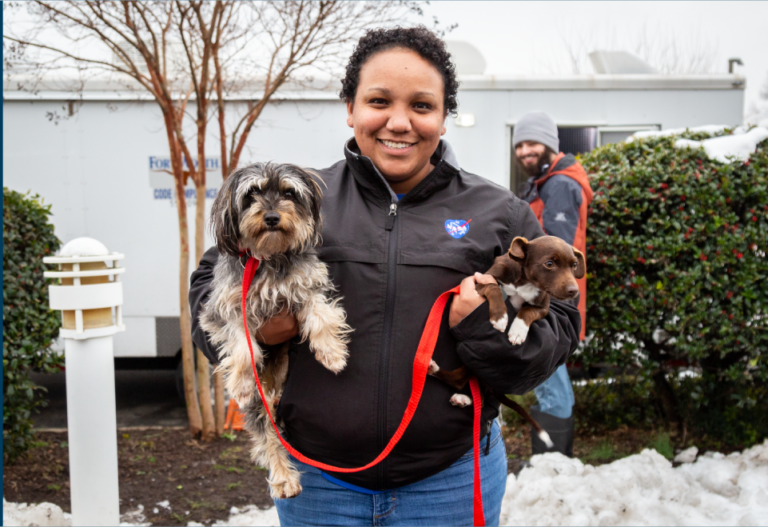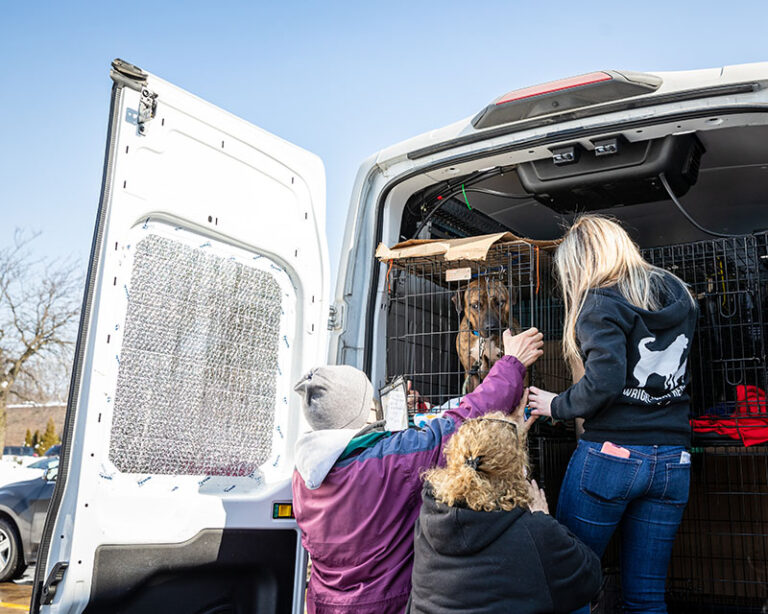Have you tried to rent a home with a pet lately? It’s hard!
Two pets? Really tough.
Three or more pets? Nearly impossible.
A dog labeled as a pit bull? In some places, it’s actually impossible.
Renters with pets face extreme difficulty in finding affordable, pet-inclusive housing. Then even once renters do have a place to live, there’s still the constant, looming threat of being told a pet is no longer welcome.
Pet restrictions, pet deposits, and pet “rent” fees vary significantly and are subject to frequent changes, meaning renters can never know if their housing is truly secure. We see the sad result at animal shelters every day, where loved pets are sitting in cages instead of home with their families.
In July, Michelson Found Animals Foundation in partnership with the Human Animal Bond Research Institute (HABRI), released their Pet Inclusive Housing Initiative Report. It provides a comprehensive overview of the impact of pet policies on the 43 million renter-occupied households in the U.S., and how expanding these housing options would benefit both landlords and renters.
As I discuss below, there are significant implications for pets and animal shelters, too.
The report’s findings are eye-opening: 76% of rental property owners say their rentals are pet friendly but only 8% are free of restrictions. Half of the rental units that allow dogs have weight limits averaging around 45 pounds.
Here’s what the tenants themselves say:
- 72% of tenants say pet-friendly housing is hard to find and 59% say it is too expensive
- 24% of tenants say their pet has been a reason for needing to move
- 14% of tenants have surrendered one or more pets as a result of their housing situation
- 33% of pet-owning residents would get another pet if restrictions on their rental housing were lifted
- 35% of residents without pets would get a pet if restrictions were lifted
What this all adds up to, according to the report, is that if restrictions were lifted, 10.5 million pets would be positively impacted, either by being adopted or by NOT being surrendered to an animal shelter.
This means we could, with no other actions, virtually solve the pet homelessness problem and help even more pets.
With only 6.5 million pets entering shelters annually and about 1.5 million losing their lives, lifting rental restrictions could completely transform our shelters and eliminate the need to house healthy, friendly cats and dogs in cages.
The pets most likely to enter into shelters are also those who are most often prohibited in rental housing—big dogs, cats, and banned breeds and types.
There is a direct, causal relationship between a lack of pet-inclusive housing and the pets who end up in shelters.
One heartbreaking aspect of all of this is that the very existence of the shelter—serving as a taxpayer-funded, no-questions-asked repository for pets who landlords refuse to allow—actually makes it possible for restrictive policies to continue unchecked. Without this option, we’d all have to face the unavailability of affordable pet-inclusive housing more directly.
So what can we do? According to the report, the situation is not hopeless.
Most landlords agree pets are valued family members and allowing pets helps to fill rental units faster, gain longer-term tenants, and builds better relationships among tenants.
The data also shows that fewer than 10% of pets ever cause damage and the average cost to repair that damage is just about $210. In 98% of cases, the pet owners pay to fix that damage themselves, without the landlord having to use any security deposit funds.
If landlords won’t make these changes themselves, according to the report 75% of people—those with pets, and those without—believe the government should make pet-friendly housing easier to find. Fifty-two percent believe the government should limit restrictions on pet-friendly housing. Among pet owners, those figures rise to 82% and 53% respectively.
HABRI envisions a future where all pets are welcomed in rental housing, with the expectation that the owner will act responsibly and the pet will behave appropriately.
They’ve created easy-to-use documents and have even written a sample “Pet Positive Pet Agreement” landlords can use.
The bottom line is this: The current situation for pet owners who rent needs to change now. Ninety-eight percent of pet owners consider their pets to be important family members and pets, just like people, should be treated as such.
With an eviction crisis looming, these housing challenges may get even more acute and urgent.
We need to, and can, transform the system that is creating needless separation of pets and people. We’ll do it through advocacy; relationship building among pet owners, animal welfare professionals, and rental agencies; individual and collective action; and telling our stories,
The next time you walk through your local shelter, and you see kennel after kennel, full of healthy, loving pets who have lost everything they know, remind yourself that this reality has virtually nothing to do with the pets themselves, but is rather due to the very human systems that tear families apart.
Join the Human Animal Support Services project to keep people and pets together, and pets out of shelters.
If you are looking for housing, or you know someone who is, My Pit Bull is Family keeps a database of dog-inclusive rentals across the country. Landlords who wish to be added to the database should reach out here.
Our eviction response toolkit offers concrete ways for shelters and other animal and human services providers to ready a response to the eviction crisis. We have more tips and tools here.
And here is a guide to supported self-rehoming, if you or someone you know can no longer keep their pets.






